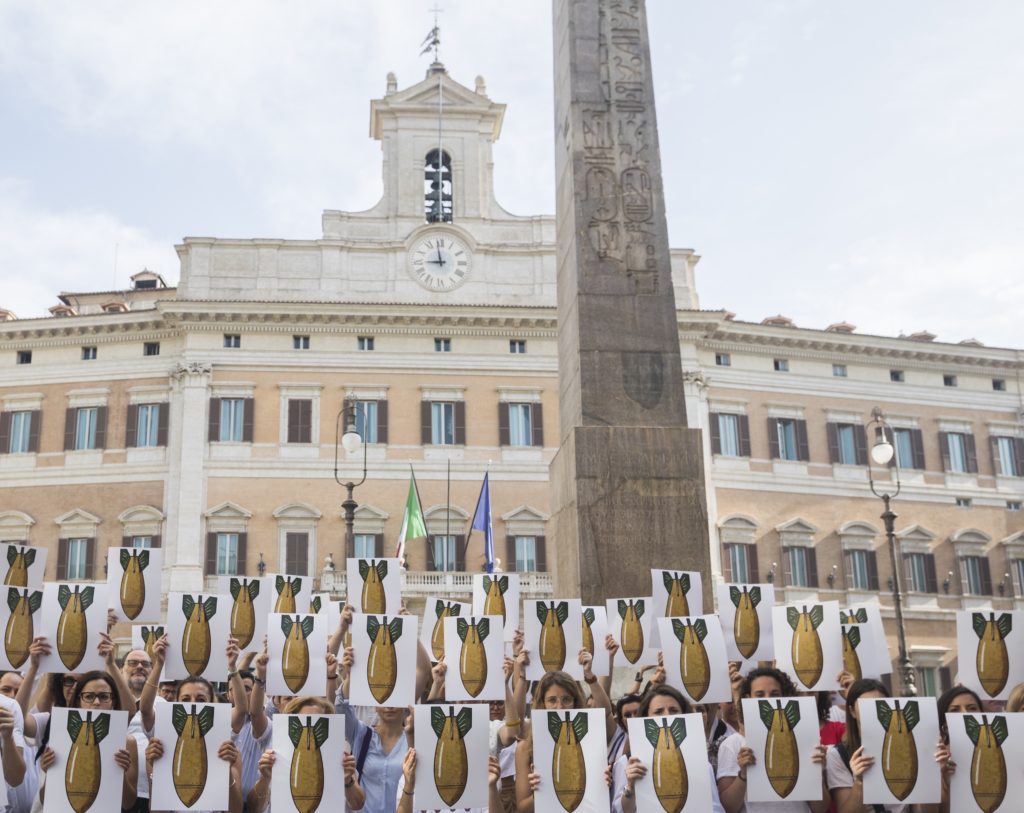The Italian Senate approved a controversial bill giving the government the power to decide whether to export arms, removing a series of intertwined controls and parliamentary debates
Su Altas of Wars by Anna Violante
The new legislation claims to adapt Law 185, in force since 1990, to new international challenges. Its objectives include minimising restrictions on arms exports, reducing the disclosure of information to parliament and civil society and, in particular, excluding documentation on the activities of credit institutions in the import-export of Italian arms and military systems from the government’s annual report.
Until now, arms exports have been roughly regulated as follows: a company wishing to sell weapons abroad must submit its application to a national authority called UAMA (Unit for the Authorisations of Armament Materials). UAMA investigates the country in need of the armaments, and if it finds that there is no risk of human rights violations and that European and international rules are respected, the export is submitted to the judgement of Parliament. Meanwhile, NGOs, representing civil society are informed about the trade and can express their opinion and try to lobby individual members of parliament (MPs) to convince them of the inappropriateness of the trading if they feel it is inadequate.
Despite the machinations of a number of governments and deals that shouldn’t have been made because the law wasn’t always applied correctly, 185/90 is still a guarantee of transparency. If the bill is approved by the Chamber of Deputies, “the government will decide in advance whether a country is eligible to receive arms, without taking into account possible changes in the situation, such as the outbreak of a war”, says Francesco Vignarca, coordinator of ‘Rete italiana pace e disarmo (the Italian Network for Peace and Disarmament)’, a branch of the international organisation ‘Control Arms’.
Under the new draft law, in fact, the Inter-Ministerial Committee for Arms Trade (CISD), which existed in the original law but was abolished in 1993, will be the main body deciding on a country’s eligibility to buy weapons. CISD is composed of the Prime Minister and the Ministers of Defence and Interior. Their knowledge of the international human rights situation will never be as accurate as that of a committee of inquiry, and their decisions will certainly be less debated than those of the entire parliament. As for UAMA, it will continue to exist. But it will be reduced to a bureaucratic figure.
As one can read on the Foreign Ministry website about the arms trade, “operations are regulated by the Government pursuant to the principles laid down in the Republican Constitution that reject war.” The Italian Constitution dates back to the end of the Second World War and the establishment of the Republic, after more than 20 years of disastrous fascist dictatorship. Article 11 reads: “Italy shall repudiate war as an instrument of aggression against the freedom of other peoples and as a means of settling international disputes; it shall consent, on conditions of equality with other States, to sovereignty limitations required for a world order that ensures peace and justice among Nations. Italy shall promote and encourage international organizations furthering such ends.”
If the participation of the Italian Army in wars of any kind has so far been limited to peacekeeping operations or NATO missions in a non-aggressive role, a different attitude has been adopted with regard to the export of arms. “Until 1990, the Italian arms industry was free to export weapons wherever it wanted, without any specific law restricting it to countries and situations where human rights were not violated,” Francesco Vignarca points out.
Law 185 was a turning point. “Actually, for thirty years, our intervention could only explicitly stop sales to Saudi Arabia when it was massively bombing Yemen, but many times, as soon as we got to know of a proposed deal, we could lobby individual members of Parliament about the risks of arming countries involved in offensive wars that endangered civilian lives. With the new changes in the law, we will not be aware of the exports and therefore unable to try to stop them.”
Vignarca continues: “The re-establishment of the Inter-Ministerial Committee for the Arms Trade (CISD) can be seen as a positive step towards ensuring the coordination of strategic decisions on the arms trade at the highest political level. We don’t criticise the increased involvement of the political authorities, but the government cannot be the only decision-making body as UAMA will lose its investigative function. In addition It will be impossible to know which companies are involved in the trade because banks will no longer be obliged to disclose their customers’ transactions”. We are faced with a dangerous opacity which, far from promoting peace and common security, will fuel wars and violence”, he concludes. “Why all this?”, Atlas of Wars ask him: “It’s for the benefit of the companies’ business, the current international state of emergency has nothing to do with it”.
